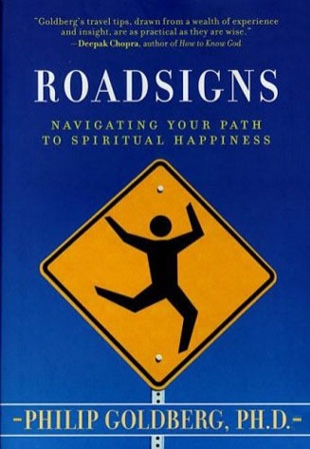Philip Goldberg is an Interfaith Minister who draws upon 30 years of experiences to offer advice on the challenges, obstacles, and joys of the spiritual journey. Whether you are on a quest by yourself or part of a religious community, the material here will prove to be illuminating.
"Adapting perennial wisdom to modern sensibility is, and probably always will be, a work in progress. Meanwhile, those of us who heed the eternal call of the spirit can only shuffle toward enlightenment as best we can." Goldberg hopes that his mapping of the territory will help readers discover their personal truths, gain new skills, expand their base of understanding, learn more about themselves, and discover some new practices. Each chapter has a wonderful section called "Travel Tips" with exercises, action steps, questions to ask, and a statement, parable or passage to contemplate. Goldberg has read widely as demonstrated by the excellent smorgasbord of thought-provoking quotations he provides from spiritual teachers of all religious traditions.
Four chapters are organized around these themes: working with guides and helpers and guiding and helping yourself; on transcending the "I" and becoming the best "I" you can be; on being in the "real world" and not being of the real world; on fully enjoying the ride now and keeping your eyes on the road ahead. Goldberg appreciates Rumi's statement: "Live at the empty heart of paradox. / I'll dance with you there, cheek to cheek." The spiritual journey consists of a dance of opposites, and there are no simple answers or closed systems of logic that can do justice to the messes of humanity and the mysteries of the Divine.
Again and again, those who have weathered the storms of life tell us that obstacles are often the best spiritual teachers. As Martin Buber puts it: "Hard times aren't the hurdles on the road to God, they are the road." Goldberg does a fine job evaluating the thorny ideas and ideals around gurus and the purposes of spiritual communities. He is even more insightful on the value of a multifaith perspective while questing. Here he quotes Huston Smith who once quipped, "A vital faith is more like an organism or a work of art than it is like a cafeteria tray."
"Don't trivialize spiritual practices." Goldberg advises. "It's all well and good to use yoga or meditation to reduce stress, or to pray for success or chant for healing. But when you use spiritual practices only for therapeutic reasons, you fail to harness their full transformational power. They are intended for Self-Realization, not just self-improvement." It is this kind of wisdom that makes this book such a worthwhile addition to field of spiritual questing.
